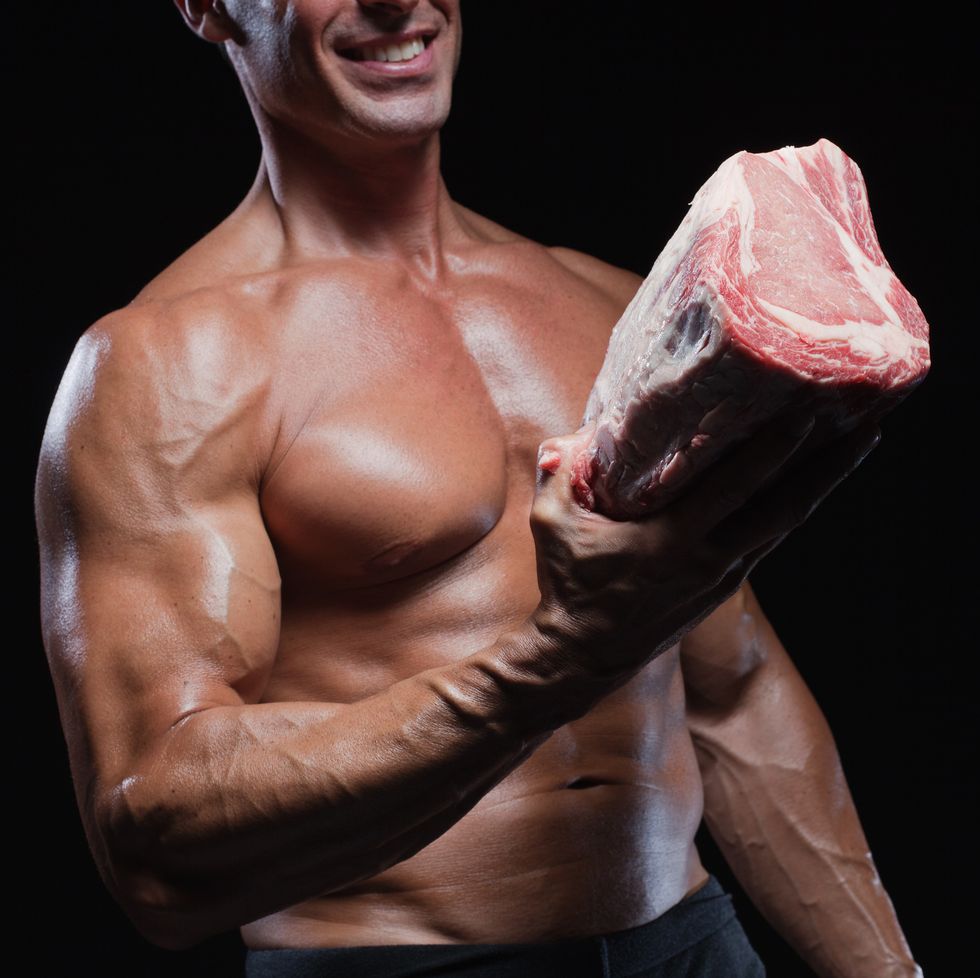SEE WHERE IT IS it feels like we’re in the thick of it protein boom, we know about the importance of the nutritious for a very long time.
In fact, back when protein was discovered in the early 1800s, scientists named the compound after the Greek word prota, meaning “primary”. It’s aptly named – the protein’s importance has since been unassailable.
Protein is essential for maintaining muscle mass and building strength, as well as filling up after eating and staying happy between meals. The thing about protein though is that you have to hit the minimum for these effects to occur.
And now, hundreds of years later, no grocery aisle is safe from protein. You can buy a protein-infusion versions of everything from cereal to chips to water. But how much protein, really, do we need?
The answer depends on several factors: body composition goals, age, weight, and gender. And, yes, some people may need to opt for the protein infused water to meet that requirement. Others may be getting a lot out of theirs normal diet alone – but unlikely. Almost 1 in 3 Older Americans miss the mark on protein intake. And, trust usyou don’t want to be low on protein.
What is Protein?
Protein is made of amino acids that are essential for building and maintaining muscles and bones. In addition, recent studies indicate that protein qualityor the overall composition of amino acids within a protein source, may become more important as you age.
But beyond your infrastructure, protein also helps regulate many cellular processes, affecting everything from your immune function to the transport of oxygen through the bloodstream. Protein can even help with weight loss: Researchers have found that it stimulates the release of satiety signals in the small intestine, which helps you feel full.
How Much Protein Do I Need?
Probably more than you are currently eating.
This may be why the recommended daily allowance for protein is 0.8 grams per kilogram of body weight per day, a number formulated during World War II to protect public health during a potential shortage. and to ensure the nutritional value of military rations.
“That RDA means that about 8 to 10 percent of your daily intake should be protein,” says Heather Leidy, Ph.D., a protein researcher and associate professor at the University of Texas at Austin.
But that 8 to 10 percent is just the minimal necessary to prevent protein deficiency, not what you need for protein synthesis, muscle gain, satiety, weight management, and glycemic control.
While most Americans’ diets may contain between 10 and 15 percent protein, Leidy notes, research suggests that anywhere from 20 to 30 percent would be a better health goal—and at least 30 grams of protein as the minimum threshold at mealtimes.
Another way to look at it: That’s between 1.2 and 1.6 grams of protein each day for every kilogram of your target body weight. So if you are a 185-pound person trying to weigh 165, you should eat between 90 and 120 grams of protein per day.
The good news is that higher amounts of protein as a result of all these snacks and shakes will not harm the liver, kidneys or bones of healthy people, as some once claimed; However, excessive protein can mean extra calories, which may cause weight gain, says Leidy.
Still, that’s a lot of protein, you may be thinking to yourself. If you read into it, you might think you need to break out your calculator and track your intake – but we think it’s not as complicated as you might think.
Actually, it’s quite easy.
How Much Protein for Muscle Gain and Weight Loss
Regardless of your goal the answer is simple: 30 grams of protein at each meal.
A 180-pound man trying to maintain his current weight would need between 100 and 130 grams, or six portions of protein-rich foods each day. That’s about 30 grams at each meal and an additional 10 to 20 grams in two snacks. Chicken breast is great, but so are chicken thighs, salmon, pork, shellfish, whitefish, lamb, and more.
Some plant foods that are high in protein: soybeans (and tofu, and soy milk), quinoa, chickpeas, lentils, any kind of nut, peas, any kind of bean, and seitan.
And don’t forget that a large scoop of most protein powders will fill you with 25 to 30 grams of the nutrient.
There is one exception to the 30 gram rule, however, and it applies to people trying to build muscle. Doing so requires more protein than the baseline level, as protein helps repair muscle tears that occur during heavy lifting – resulting in greater muscle growth.
Experts differ on how much protein you need to build muscle, but the general consensus is that if your goal is muscle gain you should eat 1 gram of protein for every pound of your target body weight.
So if you want to weigh 185 that’s stacked with muscle, that’s 185 grams of protein a day.
Why Protein Intake Changes With Age
Because muscle mass decreases with age.
Medically known as sarcopenia, the loss of muscle mass and strength as a result of aging is a natural occurrence. As the body ages, you become less responsive to amino acid stimuli, making it difficult to maintain and gain muscle. And while you are Nothing can be done to prevent it, you can do some things to combat it.
One of those things (shocker) is to take more protein. Studies A protein intake of 1.2 to 2.0 grams of protein per kilogram of body weight has been shown to be optimal for adults over 65 – a far cry from the 0.8 grams per kilogram set out in the recommended daily allowance outlined by the USDA.
If you are getting older, increase your protein intake and add some strength training into your routine, and you will maintain your muscle mass longer.
What Happens If You Don’t Get Enough Protein?
At best, you won’t build the muscle you want and you may end up snacking more often, which could lead to weight gain. At worst, you could have a protein deficiency – which is not to be expected of you.

Paul is the Food & Nutrition Editor of Men’s Health. He is also the author of two cookbooks: Guy Gourmet and Man, Pan, Plan.
Joshua St Clair is Assistant Editor at Men’s Health Magazine.
Cori Ritchey, NASM-CPT is an Associate Health & Wellness Editor at Men’s Health and a certified personal trainer and group fitness instructor. You can find more of her work in HealthCentral, Livestrong, Self, and others.


